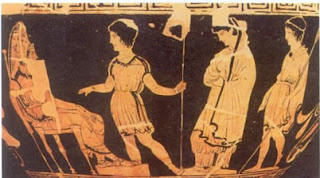Greek Classics: February Wrap-Up

Greetings everyone, have you been reading any ancient Greek literature lately? Grappling with issues as old as civilization? Or just laughing at Aristophanes' crude humor? (That probably pre -dates civilization...) This month I read Sopocles' three most famous plays, Antigone, Oedipus the King , and Oedipus at Colonus , all in the Fagles translation. I started reading Herodotus' Histories and am about a third of the way through the first book, which is all about the Persians. I'll be posting a little something about each book as I finish, since there are nine altogether and it will take a long time to read. As I'm writing this, I am very grateful for modern conveniences. Yesterday I took my girls down to Sutter's Fort for a day-long environmental living program, which means we spent the day trying to live like people in the 1840's (pre-Gold Rush!). We wore the clothes, we eschewed our cell phones, we made rope and bread and candles, we learned to wea...























